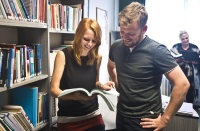|

| |
-
An exam is a gathering of colleagues. It aims to demonstrate that the course has benefited the student and that the teacher has imparted knowledge relevant to the learning outcomes.
-
The teacher is pleased with the students’ good performance and the student likes to present what they have learnt.
|
|

| |
-
The student demonstrates his/her knowledge and understanding under the conditions set by the teacher or course guarantor (see SIS) as he/she is responsible for delivering the course content and the student’s acquired competencies.
-
Both the teacher and the student shall prepare for the situation of verification of skills/knowledge so that there is no doubt about fair performance and fair assessment.
-
The teacher shall ensure that the conditions of the examination are the same for all students or that an equal opportunity rule is ensured during the examination.
|
|

| |
-
Students and teachers know that each person uses different communication styles, and they adapt to them in their interaction. This means that different teachers examine differently, just as students react differently when examined.
-
The teacher is correct and supportive in the exam. He or she is aware that he or she is making a factual assessment of the student's performance and that reactions close to frustration may contribute to the student's loss of concentration and impairment of performance.
|
|

| |
-
It is difficult for the teacher to deal with an emotional reaction from the student. The teacher understands his/her feelings, but cannot give them priority over a fair and transparent assessment. The teacher cannot change his/her assessment or the course of the exam for the reasons given. On the other hand, he/she may offer the possibility of a consultation on the subject as an appropriate type of support. If necessary, the student may be referred to psychological counselling provided by the psychologists from the Carolina Centre, or referred to by the Carolina Centre.
-
In case of need or complications, the teacher can contact the secretary of the study programme.
-
The student should take the exam in a medically and mentally fit state. If a student takes an exam while ill, this is not a violation of equal opportunity on the part of the faculty or teacher. (For example, if a student takes an exam while suffering from a fever, which would affect his/her academic performance, it is not possible to retroactively invalidate the exam result by referring to this medical condition.)
|
|

| |
-
The teacher decides the result of the examination. The course of the examination or the teacher’s comments at the very end of the examination should indicate why the received a given evaluation for his or her performance. The student has the opportunity to ask about this.
-
Both the teacher and the student know that it is possible to fail the exam. This is an outcome that can occur. However, it is not intended to affect the relationship between the student and the teacher in any way.
-
The teacher has his/her consultation hours in which the student can contact him/her to consult any uncertainties the student has.
-
The student shall always excuse himself/herself from attending examinations on time.
|
Students with special educational needs
|

| |
-
Students with special educational needs have the opportunity to request modifications to their studies and examinations, which are defined in the diagnostic interview assessment.
-
The diagnostic interview assessment is a document issued by Charles University for a specific student. Other documents are irrelevant.
-
The diagnostic interview assessment specifically describes the modifications that are intended to support the student’s studies.
|
|

| |
-
Neither the student nor the teacher can propose and implement other modifications to the exam/study.
-
If the student considers that he/she needs different and additional types of support, he/she shall again contact the provider of diagnostic interviews, who will update the diagnostic interview assessment according to professional judgement.
|
|

| |
-
A student with special educational needs may, but is not required to, contact the teacher to request a modification.
-
The student can contact the teacher directly or the contact person to request a modification.
-
In this case, the student submits the diagnostic interview assessment to the teacher so that the teacher is familiar with the type of modification requested.
-
When the student contacts the contact person, the contact person negotiates with the teacher on his/her behalf and communicates the result to the student.
|
|

| |
-
The student shall request the modification at least 7 days before the examination date so that the modification can be arranged. Otherwise, the modification cannot be guaranteed (especially if it concerns the spatiotemporal arrangement of the exam).
-
In the case a student who has requested a modification withdraws from an exam, the student should inform the teacher by email so that he/she knows that it is not necessary to arrange the modification for that date.
|
| |
-
The teacher, unless it conflicts with the nature of the exam, will arrange the modification, either alone or in collaboration with the secretary of the study programme or the contact person.
-
Modifications usually involve increasing the time of the examination, requesting time for preparation, conducting the written examination in a different room, preference for oral versus written examinations, use of specific aids, conducting the examination outside the examination period, etc.
|
This guide was created based on feedback from students and teachers.